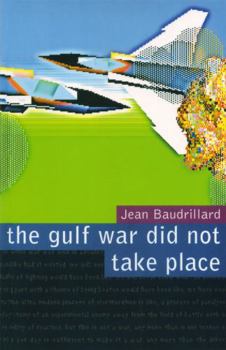The Gulf War Did Not Take Place
Select Format
Select Condition 
Book Overview
Comprised of three essays written by Baudrillard in the lead-up to, during, and after the military clash in the Gulf in 1992, this book is a penetrating and provocative analysis of the unfolding drama using the author's well-known concepts of simulation and the hyperreal. Paul Patton's introduction surveying the debate aroused by the conflict argues that Baudrillard, more than any other critic of the events, correctly identified the political stakes involved in the gestation of the New World Order.
Format:Paperback
Language:English
ISBN:090995223X
ISBN13:9780909952235
Release Date:August 2012
Publisher:University of Washington Press
Length:87 Pages
Weight:0.30 lbs.
Dimensions:0.2" x 5.4" x 8.3"
Grade Range:Postsecondary and higher
Customer Reviews
5 ratings
The war happened, but didn't take place...
Published by Thriftbooks.com User , 16 years ago
Provacativively titled book either impresses or deeply angers people, I read this years ago and retained only a few points of interest. Yes, the war happened, as in bombs were dropped, people died, buildings were destroyed, many suffered, etc. But it differed markedly from previous wars in that it was mainly an event to be manipulated by different sides in the media. Therefore, it did not take place the way previous wars had, in that the suffering and even a uniform understanding did not penetrate the population at home who watched the events on CNN. Unfortunately, all of this business about the 'realness' of the war, and the simulacra, and the hyper-reality we're now mired in, is written in a frustrating and unnecessarily bloated style that makes even this slim work a slight chore at times. Can certainly be expressed in a simpler way, therefore appearing less profound, but then it wouldn't be the work of French postmodern philosopher. Interesting 'take' on a modern war, with points that would only resonate more in the years since, it's hit-or-miss for most readers of current events (more for the philosophy crowd).
Short and Sweet
Published by Thriftbooks.com User , 17 years ago
This book basically describes how the first Iraq war differed from traditional wars of the past. It is not for everyone, Baudrillard has the unfortunate position of being too loose with ideas to be taken very seriously by 'real' academics while at the same time writing in a style that is not easily accessible to a popular audience. His thesis is that the 'war' was primarily a media event that was useful in different ways to both sides of the conflict. He does not dispute that violence and suffering took place, but suggests that the event was not a war as was defined in the past by Clausewitz. Any review that states he is trying to 'hide' the essential suffering of those at the ground of the event is just wrong. There is nothing in the book that questions or calls into doubt the experiences of soldiers or civilians; at the same time it does not dwell upon them.
Pure sociological poetry
Published by Thriftbooks.com User , 24 years ago
A brilliant response to the mediated non-event of the Gulf War - a must read for anyone with lingering illusions on the nature of war in the unipolar post-Cold War world in which media war has eclipsed war itself and Clauswitz's definition fails to find resonance
Baby food
Published by Thriftbooks.com User , 24 years ago
Reading this turned my head to much. That means it's good.
One of the most important political texts of the 1990s
Published by Thriftbooks.com User , 25 years ago
This text describes and defines the relations between the dominant states (USA Western Europe), the media and the wars they choose to have.Wonderful read and learn





